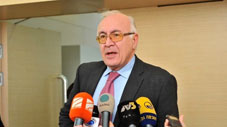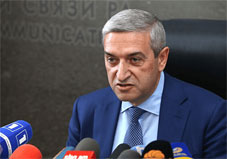
Not discussing opening any additional trade corridors with Russia
By Tea Mariamidze
Friday, July 14
Georgia’s special representative for relations with Russia, Zurab Abashidze, says that Georgia and Russia are not discussing the opening of any other additional trade corridor via occupied territories of Georgia under the customs administration and trade monitoring deal signed between the two countries in 2011.
Abashidze made the statement in response to Vahan Martirosyan, the Minister of Transport and Communication of the Republic of Armenia, who a few days ago expressed hope that under the deal Russia and Georgia would open a new transit corridor via Georgia’s occupied Abkhazia and South Ossetia regions, that would enable Armenia to have an alternative route of Upper Lars in order to transport its goods to Georgia and Russia.
“It will ease freight transportation in the North and create competitive atmosphere, which will positively reflect the pricing policy,” Martirosyan stated.
“The process depends primarily on the development of Russia-Georgia relations. The concrete result will be seen only when the trade corridors are opened. I hope this will happen in the near future,” the Armenian minister told a local news outlet, newsarmenia.am.
Abashidze says that at present, negotiations are underway to implement the existing terms of the agreement and not to add new ones into it.
“A Georgian-Russian-Swiss Working Group will be set up to monitor the implementation of the Agreement…this process should be completed and now we see prospects for this,” Abashidze added.
On November 9 2011, in Geneva, with the participation of Switzerland, Georgia and the Russian Federation agreed on having a neutral company monitor the movement of goods. The Swiss Confederation was tasked with selecting a neutral private company in consultation with Georgia and the Russian Federation.
The agreement does not mention any geographic name, only geographic coordinates. The agreement establishes three trade corridors: Adler – Zugdidi; the village of Nar (North Ossetia) – Gori; and Zemo Larsi – Kazbegi. All goods entering and exiting these corridors would be subjected to monitoring by the neutral private company.
The sides agreed to create a mechanism of customs administration and monitoring of trade in goods. The mechanism’s functions included gathering and sharing information, ensuring transparency, data transfer, crime and smuggling prevention, and examining suspicious cargo.
Georgia and Russia decided that the mechanism would entail both an Electronic Data Exchange System (EDES) and International Monitoring System (IMS).
However, despite the fact that agreement was signed six years ago, Russia has not implemented its terms.
Abashidze claims Georgia is now waiting for Russia’s step to list the contract agreement and sign a relevant deal with a neutral company over the signed agreement, as Georgia and Russia have no diplomatic relations following the Russia-Georgia 2008 war.


